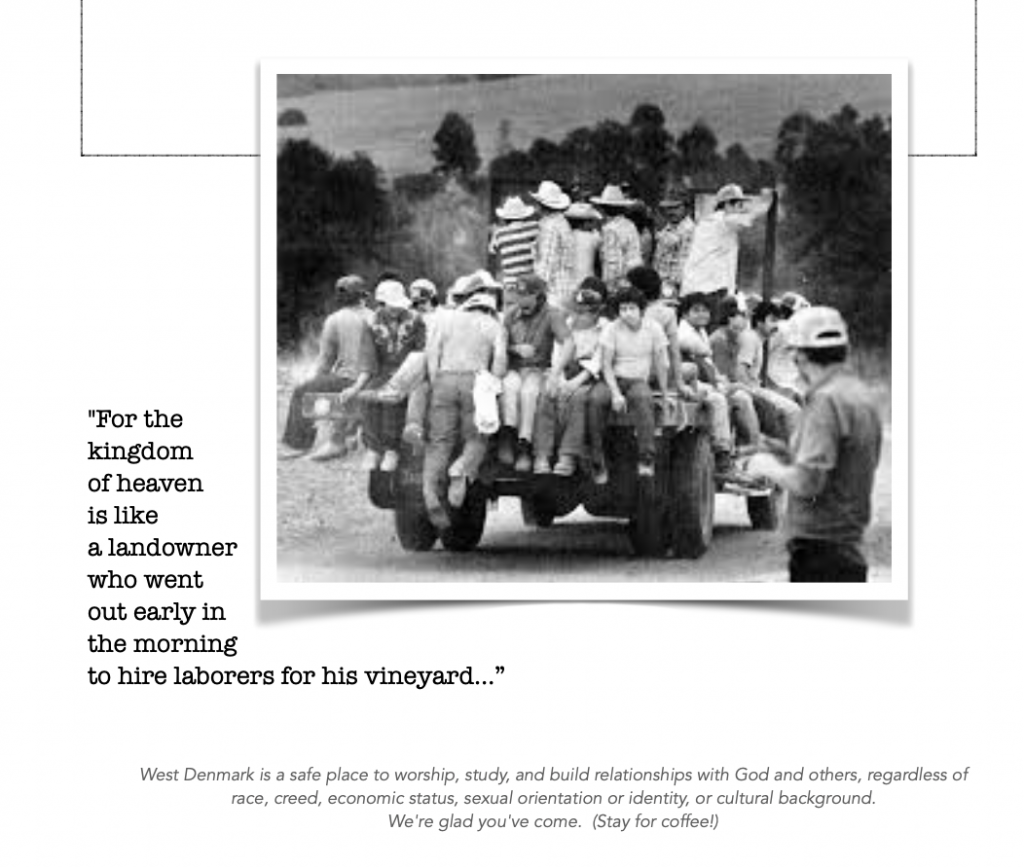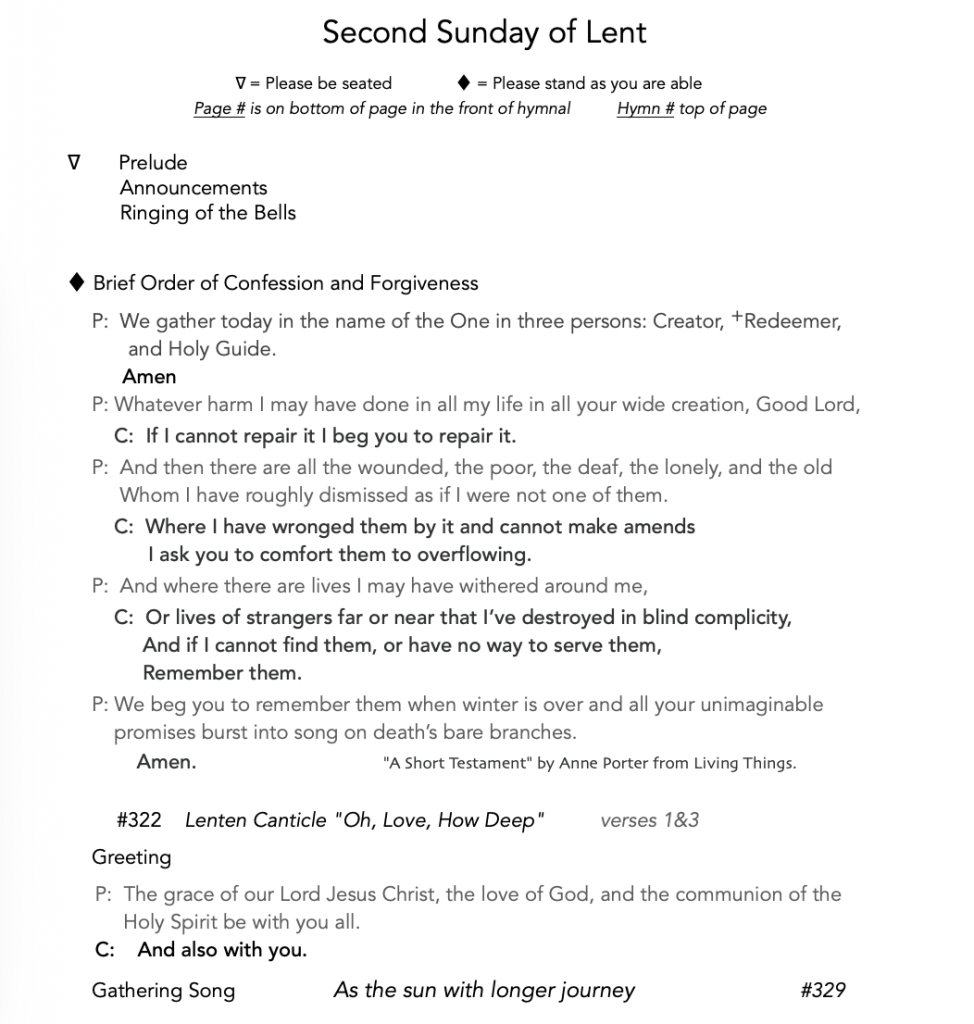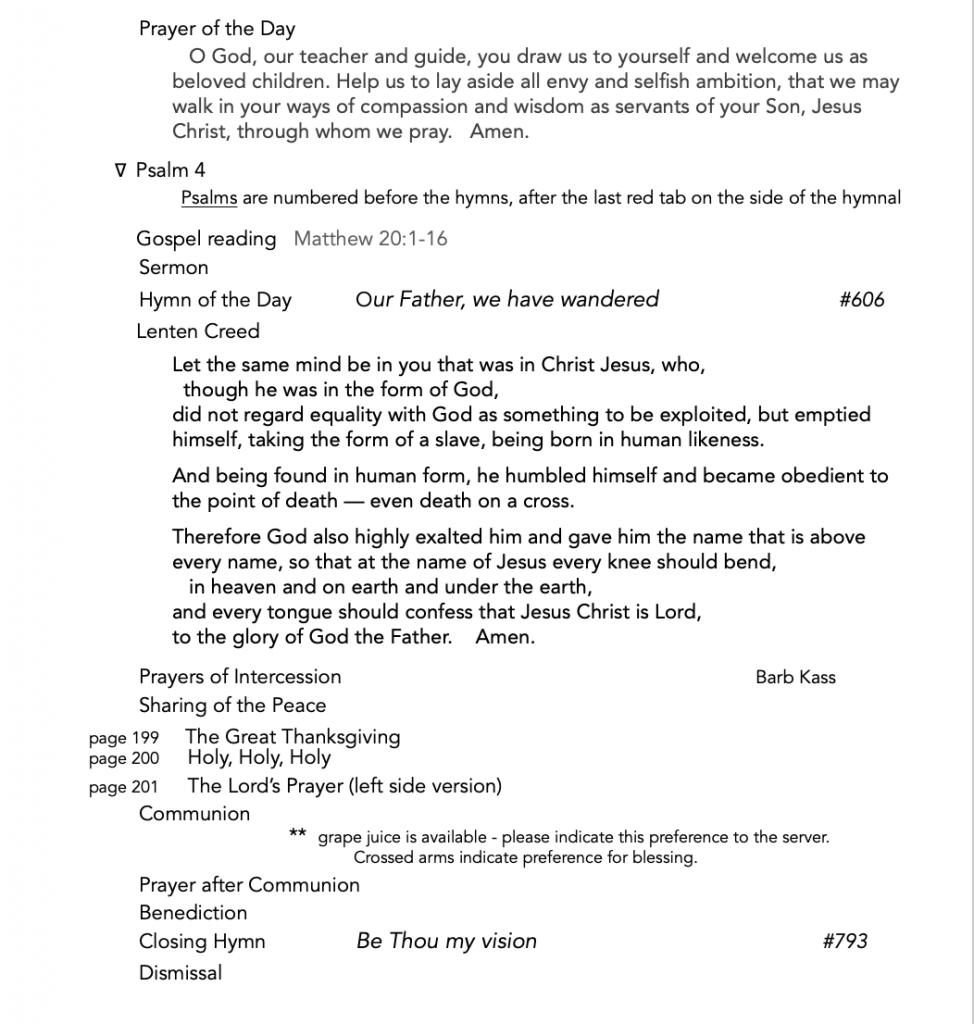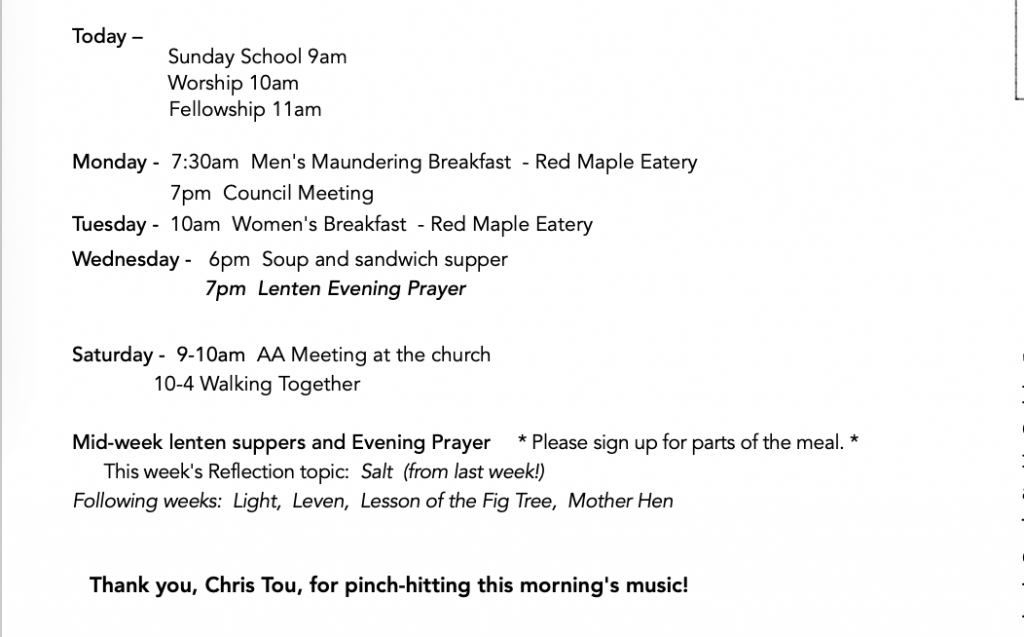Audio Recording



Matthew 20:1-16
“For the kingdom of heaven is like a landowner who went out early in the morning to hire laborers for his vineyard. 2After agreeing with the laborers for the usual daily wage, he sent them into his vineyard.
3When he went out about nine o’clock, he saw others standing idle in the marketplace; 4and he said to them, ‘You also go into the vineyard, and I will pay you whatever is right.’ So they went. 5When he went out again about noon and about three o’clock, he did the same.
6And about five o’clock he went out and found others standing around; and he said to them, ‘Why are you standing here idle all day?’ 7They said to him, ‘Because no one has hired us.’ He said to them, ‘You also go into the vineyard.’
8When evening came, the owner of the vineyard said to his manager, ‘Call the laborers and give them their pay, beginning with the last and then going to the first.’ 9When those hired about five o’clock came, each of them received the usual daily wage. 10Now when the first came, they thought they would receive more; but each of them also received the usual daily wage. 11And when they received it, they grumbled against the landowner, 12saying, ‘These last worked only one hour, and you have made them equal to us who have borne the burden of the day and the scorching heat.’
13But he replied to one of them, ‘Friend, I am doing you no wrong; did you not agree with me for the usual daily wage? 14Take what belongs to you and go; I choose to give to this last the same as I give to you. 15Am I not allowed to do what I choose with what belongs to me? Or are you envious because I am generous?’
16So the last will be first, and the first will be last.”
This parable is so interesting. I would love to have seen the reaction on people’s faces when Jesus told it, because, even now, it creates a visceral reaction in us as listeners.
Although not all of the parables Jesus tells are about the kingdom of heaven, most relate to it in some way. And even though we may not quite understand some of the more obscure sayings, we are rarely offended by them. I mean, how can the kingdom of heaven be offensive? We might feel sorry for the prodigal son’s older brother when he stomps off feeling betrayed by his father. And the parable of the good Samaritan can be disconcerting in that it ends up being the enemy who proves himself the good neighbor, but this one is different. This arouses some emotion.
Is it because it’s about wages and what’s fair? Does is stir old jealousy and self-worth issues? I think that’s what we hear, but it is actually about the kingdom of heaven and grace, God’s love. So why doesn’t it feel gracious?
I’m reading a book on an entirely different matter, but it says something that might be pertinent. The author describes the profound effect Calvinism has had on the American psyche — even of Lutherans. The author describes it this way:
“According to Calvinism, God likes some people better than others and expresses his approval through earthly gifts. Health, wealth, and happiness are proof of God’s favor. Poverty and suffering are telltale signs of sin. Whether people will be favored or rejected by God is already decided before they are born. Some are predestined to be saved, and some are earmarked for damnation.
“Contrary to what you might expect, this doctrine didn’t plunge its believers into despair or stop them from making an effort. On the contrary, it spurred them on. By working hard, amassing wealth, and keeping their lives in good order, they could prove to themselves and others that they were among the elect. This is the source of the Protestant work ethic.
“The Calvinist impulse has broken free of its Protestant origins and entered the collective unconscious of Americans.
“In medieval Europe, people looked to the impoverished and emaciated for spiritual teachings. Austerity was the mark of a saint. In America, the prerequisite for any spiritual teacher is a life that works. We don’t turn for guidance to someone who can’t pay the electric bill. Consciously or unconsciously, we assume that the spiritually accomplished lead, healthy, prosperous, and well ordered lives.” That’s a quote from Catherine MacCoun.*
This explains why we have the cult of celebrities, why the rich and famous make the news, why winning sport teams or individual ‘stars’ credit God for getting them where they are – the losers don’t do that. It’s the driver of Manifest Destiny, why we continue to have deeply ingrained racism and classism. It’s because those on the bottom are destined to be there.
You may not consciously believe that…. but we do believe it.
That’s why this parable seems so unfair. The Protestant work ethic; Justice; Fairness; Virtue and the American Way. We get what we deserve (we believe), and if others don’t work as hard — or rather, if they don’t achieve the same results (we tend to conflate those two things) — then they don’t deserve what we have.
This parable bothers us because it’s not fair for the workers who were out there all day long in the heat of the sun not to get more than the ones who only worked for an hour. The first were hardworking, the last hardly worked. The first were righteous, the last were unworthy. The first were furious, the last were amazed.
True, the landowner contracted with them for the amount they would get paid, and paid them what he said he would. BUT, when he hired all the rest, he said he’d pay them ‘what was right’ — and how can it be right to pay everyone the same thing? If he’s generous with the last, he ought to be even more generous with the first. Right?
We can’t know what Jesus’ original audience thought, but it would have bothered people back then, too, at least to the extent that they considered themselves privileged and chosen and the elect.
The radical equality of the kingdom of heaven is galling to those of us who count on entitlement.
So, let’s back up a step.
The kingdom of heaven is like… that’s how it begins. This isn’t advice from God on how to run a business or how wage schedules should be set. This is what God’s reign is like, God’s will.
The kingdom of heaven is like loving your neighbor as yourself. Maybe Jesus should have begun all his parables that way. This is what loving your neighbor as yourself could look like.
It would be as if a landowner went out early in the morning to gather workers… and in the end paid them all equally, even though they began at different times, had different needs, different experiences, backgrounds, issues, and different skill sets. Maybe that doesn’t help. We are too strongly bound to merit as the basis of justice.
If the parable was about a mother hen sitting on her eggs, who was overjoyed and filled with such warm, adoring love when the first chick pecked it’s little head out of the shell, that she fluffed her feathers and clucked and coddled the little chick — And a day passed, and then another egg cracked and a scraggly wet head popped out, and then another — And momma hen clucked and fluffed and resettled herself to give each tiny bird the warmth it needed — and by the next evening all six eggs had finally hatched and downy little chicks were jostling and snuggling and wiggling under momma hen’s wings and she was clucking and fluffing and so pleased she just about crowed with joy — If that was the parable, would we be angry?
Of course not. We know love expands to the whole nest. We expect God to love, right?
Well, I will remind you of Hans Christian Andersen’s fairy tale of the ugly duckling and how the signet swan was treated. Or how upsetting it is to watch a cowbird egg hatch and take over a warbler’s nest and watch the warbler chicks die. We only want God’s love to apply to our nest, our kind. Because that is how fairness works, right? We want God to be fair according to our standards of justice. At least we want to choose our neighbors before we commit to loving them as ourselves.
But that is what we don’t get to choose. We do not get to choose the merits of our neighbors, nor the standards of God’s love.
The deeper into the kingdom of heaven we are drawn, the less we get to choose the circumstances or conditions or people we love. They are thrust upon us. Following in the way of Christ causes us to grow, requires us to grow. Jesus originally told this parable against the Pharisees and professional religious of his day who scorned the poor and outcast. Matthew used it to tell Gentiles they were as loved and welcomed as their Jewish brothers and sisters in God’s grace. You might realize that marginalized people hear this parable quite a bit differently than we are likely to. We are invited to share in their joy, to open our imaginations and our hearts and set any jealousy or rancor aside.
In the kingdom of heaven, whether we like it or not, the last will be first and the first will be last and the middle seem to stay in the middle. Wouldn’t it be great if we could cheer that happy exchange? Because in the reign and realm that God creates, everyone is equal in the Mother Hen’s love. Everyone.

- * Catherine MacCoun. On Becoming an Alchemist – a guide for the modern magician, Trumpeter press 2008